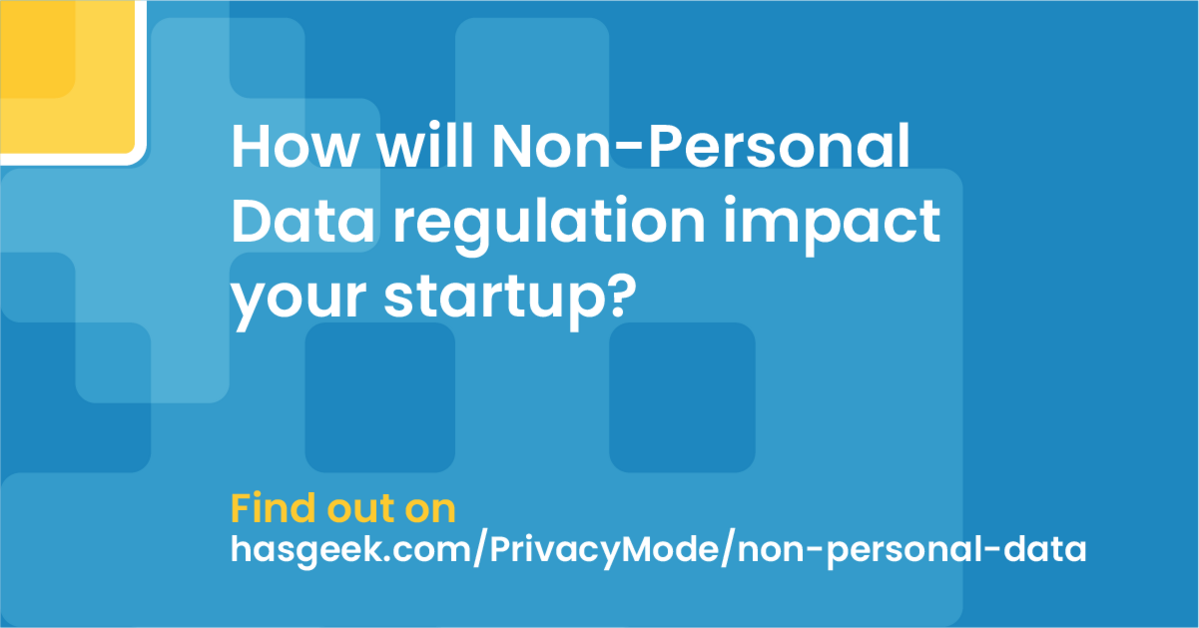This summary is divided into two parts. The first part lists out the questions that were discussed in the panel.
The second part lists the recommendations that startups and investors made for future iterations of NPD. Part II of the summary is published on https://hasgeek.com/PrivacyMode/npd-week/sub/summary-of-panel-discussion-on-impact-of-npd-on-st-EdomcGVBeQyWnLfzVzub7n
Amlan Mohanty, Public Policy Counsel at Google moderated the panel. The panel discussed three broad topics:
-
First principles and justifications for NPD.
-
Trade-offs and compliance burdens.
-
Regulatory issues.
-
Questions on First principles and justifications for NPD:
- A fundamental premise of the new report is that raw/factual data can generate economic value if shared. Where does raw data lie in the value stream? Is there any incentive for businesses to share (non-proprietary) factual data with others, given the costs of collecting and storing raw data?
- The recommendations talk about a “public good purpose”, i.e. data that can benefit the society at large if shared. Let’s take a hypothetical policy objective of increasing language diversity. Will mandating the sharing of NLP datasets help achieve that goal? If not, what’s the right approach?
- A lot of voluntary data sharing already exists (eg. TensorFlow), which startups have access to. Is there evidence of market failure to justify forced sharing of NPD?
- Trade-offs and compliance burden:
- There seems to be a contradiction in the government’s goal of promoting ease of doing business, while introducing new regulations that are compliance heavy. However, assuming every business will (eventually) be a data business, do you see compliance with data regulations as a reasonable cost of doing business in India?
- Is there value in having a public metadata directory? Does the perceived utility of such a directory outweigh the potential privacy and security implications of such a policy?
- The NPD regime will equally apply to government organizations, which are custodians of vast amounts of data. It seems like unlocking this data can have significant social benefits. Should we be thinking about incentives and justifications for forced data sharing differently in the context of government data?
- Regulatory issues:
- Hasgeek’s report suggests that lack of regulatory clarity (for eg. on IP rights) impacts valuations. As an investor, do you see new NPD regulations as a loss of competitive advantage for startups you invest in, or does it help reduce barriers to entry in new markets?
- The committee suggests that sectoral regulators can develop NPD regulations in addition to those developed by the NPDA. What role do you see for sectoral regulators in facilitating access to “high-value datasets” (eg. healthcare, transport, etc.)?
- If we can separate the prescriptive rules from the larger governance principles that are being suggested by the committee -- are there any useful principles that can help optimize existing data sharing practices and promote India’s open data ecosystem (for example, promoting interoperability through APIs)?
The panelists on this session were:
- Deepa Venkatraman, CEO at Nilenso
- Shweta Rajpal Kohli, Head of Public Policy at Sequoia
- Ashish Aggarwal, Head of Public Policy at NASSCOM
- Kumar Rangarajan, co-founder and CEO of Slang Labs
- Prasanto Roy, public policy consultant
- Sameer Brij Verma, Managing Director at Nexus Venture Partners
- Thiyagarajan Maruthavanan (Rajan), Partner at Upekkha, Value SaaS Accelerator



{{ gettext('Login to leave a comment') }}
{{ gettext('Post a comment…') }}{{ errorMsg }}
{{ gettext('No comments posted yet') }}